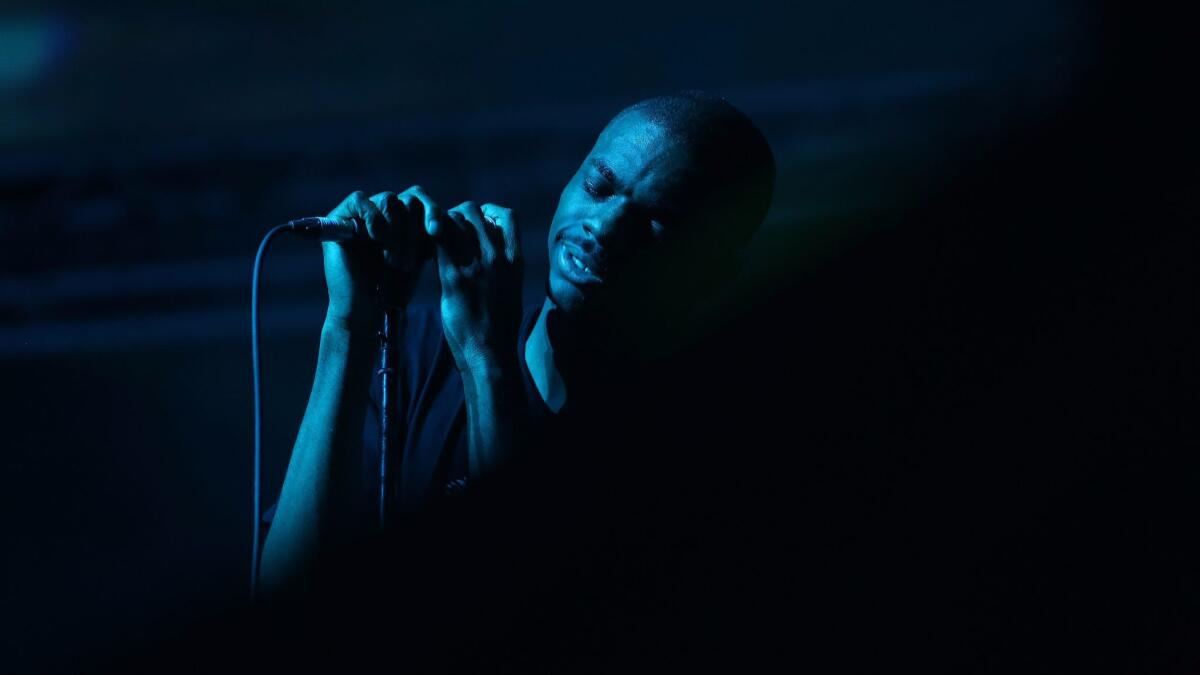Long Beach rapper Vince Staples discusses creating art for art’s sake — and being inspired by Madonna and Duran Duran

First, regarding the title of Long Beach rapper Vince Staples’ new record, “Big Fish Theory”: The moniker does not refer to any particular doctrine or a chalkboard full of equations.
“It comes from something that I experienced as a child, which became several realizations as I got older,” Staples said last week, on the eve of the June 23 release day.
That’s all Staples, 23, wants to say about it — except that for him the title doesn’t have anything to do with the adage about being a big fish in a small pond.
“It represents whatever the listener hears,” he explained, “because my art is open for interpretation and it’s up to people to figure out what they want from it.”
Issued 11 months after his acclaimed “Prima Donna EP” and two years after his major label debut, “Summertime ’06,” Staples’ new work finds him focusing on faster tracks that draw on a range of beat-based subgenres.
Notably, much of it was recorded at famed EastWest Studios on Sunset and mixed by longtime Madonna, Bjork, Coldplay and Massive Attack producer-collaborator Mark “Spike” Stent. Sonically, it seems to shimmer as a result.
The album comes from a self-described former street hustler who “shoulda been dead broke — shoulda been chalked out/ But it didn’t happen — now it’s time to get it cracking,” as Staples raps on the song “Big Fish.”
Across the album, the artist dismisses the kind of gauche displays of wealth that have tended to signal rap success: “Ain’t a damn thing funny, but we laughing to the bank,” he raps on “SAMO,” “Never blow it on a chain, rather blow my ... brain.”
On “Party People,” he forgoes bravado in favor of vulnerability by confessing to having a “couple problems my cash can’t help/ human issues, too strong for tissues.”
Album closer “Rain Came Down” paints Staples as a kind of invisible everyman with “10 toes in the street,” describing himself in haunting terms as “the blood on the leaves/ I’m the nose on the Sphinx/ Where I’m from we don’t go to police/ Where I’m from we don’t run — we just roll with the heat.”
Staples, who grew up one of five kids in Long Beach’s working-class Ramona Park neighborhood, first stepped into the spotlight through an affiliation with members of the Odd Future rap collective. At 16 he appeared on Earl Sweatshirt’s 2010 self-titled mixtape, and three years later returned for Earl’s first studio album, “Doris.”
As a solo artist, Staples earned early kudos through “Stolen Youth,” a collaboration with rapper-producer Mac Miller (as Larry Fisherman).
Staples’ stubborn aversion to rap tropes has come to define his aesthetic, as has his willingness to experiment. That’s the result, he says, of feeling “no need to please anyone, because I’m here to do something that hasn’t been done before and I feel like I’m on a path to do that, creatively.”
He clarified: “Not commercially, but creatively. For the art itself.”
He collaborates with producers including British experimental pop creator Sophie, Australian “future-bass” producer Flume, the L.A.-based Nigerian American sibling team Christian Rich and, most extensively, L.A. beat producer — and current Yale undergrad -- Zack Sekoff. Sekoff is credited on five “Big Fish Theory” tracks.
Sekoff’s a disciple of the lauded Lincoln Heights club the Low End Theory, whi;ch last year released a solo album on Daddy Kev’s Alpha Pup imprint. Staples met Sekoff when both were music-loving teenagers and became fast friends.
“It’s interesting, because we’re a similar age — Vince is maybe three years older than me — but we grew up in very different parts of the California experience,” Sekoff, who went to private Santa Monica college-prep school Crossroads, said. “But we really connected on a lot of different levels.”
Sekoff said, “He’s a really curious person, and we’re both kind of similar like that. If there’s something we don’t know, we want to figure it out — we’ll do the research.”
When he was debating whether to go to Yale or pursue production as a career, Sekoff said that Staples helped him decide. “He was like, ‘You know, I never got the opportunity to go to college.’ He was excited about the potential of me going to school and exploring art and politics further.”
Sekoff is heading into his senior year at Yale, and is doing so with a resume that includes collaborating on one of the most critically acclaimed albums of the year.
Other contributors to “Big Fish Theory” include Compton rapper Kendrick Lamar, R&B singer Ty Dolla Sign, Oscar-winner Juicy J (Three-Six Mafia) and avant-rock singer and songwriter Justin Vernon, a.k.a. Bon Iver.
And Staples is heading toward commercial success almost despite his approach; the album has been near the top of the iTunes charts since its release, and on Tuesday Staples landed on “The Tonight Show with Jimmy Fallon” to perform the song “Love Can Be ...” with help from Blur’s Damon Albarn, rising R&B singer Kilo Kish and reality star Ray J.
Produced by Miami beat team GTA, the track bounces with midnight-on-the-dance-floor energy.
That was the intention, said Staples, citing what some might consider an unlikely inspiration. “If you look at ‘Like a Virgin’ by Madonna, the way that song sounds is so pretty and sparse. It doesn’t sound like Michael Jackson or Queen,” Staples said.
Name-checking Duran Duran and the Pet Shop Boys, Staples added, “They became pop — but that’s not ‘Thriller.’”
That Staples tips white 1980s British pop bands that peaked before he was born might irk some rap snobs, but so what?
“We did everything from a creative standpoint,” Staples said. “We never think about what’s going to sell and what’s going to become mainstream pop culture. We’re just here to create uniqueness.”
For tips, records, snapshots and stories on Los Angeles music culture, follow Randall Roberts on Twitter and Instagram: @liledit. Email: randall.roberts@latimes.com.
More to Read
The biggest entertainment stories
Get our big stories about Hollywood, film, television, music, arts, culture and more right in your inbox as soon as they publish.
You may occasionally receive promotional content from the Los Angeles Times.











